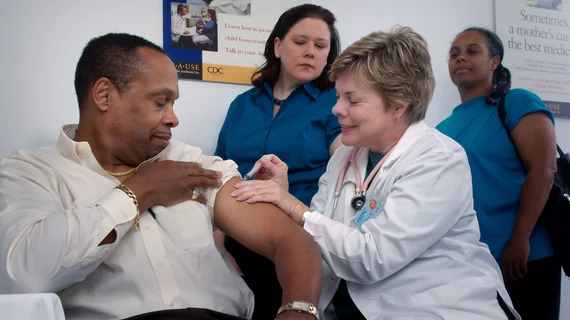Seasonal influenza (flu) vaccines lower a person’s risk of developing cardiovascular disease (CVD), according to new findings published in JAMA Network Open.[1]
The study’s authors tracked data from six different randomized controlled trials, including a large multicenter trial from 2021 that focused on myocardial infarction patients, for their analysis. A total of 9,001 patients were included in the meta-analysis. The mean patient age was 65.5 years old, 57.5% of patients were men and 52.3% had a history of cardiovascular complications.
Almost exactly half of the patient population — 50.1%, to be exact — received a flu vaccine. The major adverse cardiovascular event (MACE) rate after one year was 3.6% among patients given a flu vaccine and 5.4% among patients given a placebo or control. Also, 1.7% of flu vaccine patients and 2.5% of all other patients died from cardiovascular causes
The flu vaccine’s impact was especially significant among patients with a recent history of acute coronary syndrome (ACS). The one-year MACE rate among vaccinated patients with recent ACS was 6.5%, nearly half of the one-year MACE rate among unvaccinated patients with recent ACS (11%).
The authors noted that the impact of flu vaccines on MACE rates and cardiovascular mortality was comparable with “guideline-recommended mainstays of cardiovascular therapy, such as aspirin, angiotensin-converting enzyme inhibitors, beta-blockers, statins and dual antiplatelet therapy.”
“We urge clinicians to continue counselling their high-risk patients on the cardiovascular benefits of seasonal influenza vaccination, especially given the historically low uptake of this low-cost and well-tolerated intervention,” wrote first author Bahar Behrouzi, MSc, a health policy specialist with the University of Toronto and Women’s College Hospital, and colleagues.
Related Acute Coronary Syndromes Content:
Flu vaccine after heart attack reduces risk of death
VIDEO: USPSTF official discusses new low-dose aspirin recommendations
How the science behind COVID-19 vaccines could transform care for heart attack patients
VIDEO: Cardiac CT now recommended as a front-line chest pain assessment tool
Reference:

